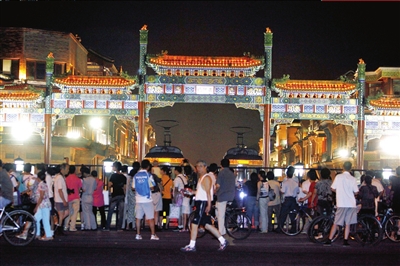 |
|
?File photo |
Beijing will reopen one of its oldest commercial areas as the latest cultural and tourist attraction ahead of the Olympics, officials announced on Tuesday.
After a massive refurbishment lasting over one year, the Qianmen Street in the heart of the Chinese capital will be opened to visitors on Aug. 7, one day ahead of the opening of the 29th Summer Olympics, said Wang Chengguo, spokesperson of Beijing's Chongwen District where the street is.
A dozen local brand-names originated from Qianmen in the past century, such as the Quanjude roasted duck restaurant and the Zhangyiyuan tea house, will also open their new outlets on the same day, Wang told a press conference.
"The aim of the refurbishment is to restore the glory of Qianmen as a key commercial and cultural hub of old Beijing, and meanwhile to improve the infrastructure of the neighborhood," Wang said.
The area is expected to display Beijing's historic and cultural heritage to visitors from all over the world, which is also in line with the Olympic spirit to encourage cultural exchange and mutual understanding, he said.
Qianmen Street lies on Beijing's historic central axis just south of Tian'anmen Square and the Forbidden City, the imperial palace from the mid-Ming Dynasty (1368-1644 AD) to the end of the Qing Dynasty (1644-1911 AD).
The commercial street took shape about 570 years ago and reached its peak of importance in the 1920s and 1930s, garlanded with restaurants, theaters, silk stores and tea houses. It was still a famous shopping area even before the refurbishment, despite its rundown conditions and over-population.
The street was closed for the face-lifting project in May 2007, with old buildings demolished and road surface newly paved. A tramway was also restored after it was discontinued in the 1960s.
But the tramway along the 840-meter street will not be operational during the Olympics because Olympic marathon runners will pass along the street, Wang Chengguo said.
The Qianmen project, costing about 300 million U.S. dollars, has triggered controversy since it was launched. Some preservationists feared that the area might lose its spirit after traditional one-storey courtyards, a symbol of old Beijing, were forced to make way for upmarket residences and commercial outlets.
But Wang defended the project, saying all buildings along the street were built in original style in order to retain traditional touches.
"The project has received a positive response from some 40,000 local legislators, scholars, experts, residents, foreigners and media who were invited to pay visits here," he said.
Parking facilities, mobile toilets and interpreters will be deployed around Qianmen Street to make it a convenient shopping area, he said.
Tian Yun, chairman of the Qianmen developer Tianjie Real Estate Company, told the press conference that 9.5 billion yuan (1.37 billion U.S. dollars) would eventually be invested to restore the greater Qianmen area, which includes one million square meters of courtyard residential area.
He also confirmed media reports that some international brand-names, reportedly including Starbucks, Nike, Prada and Rolex, would occupy half of the street's shops.
(Xinhua News Agency July 30, 2008)